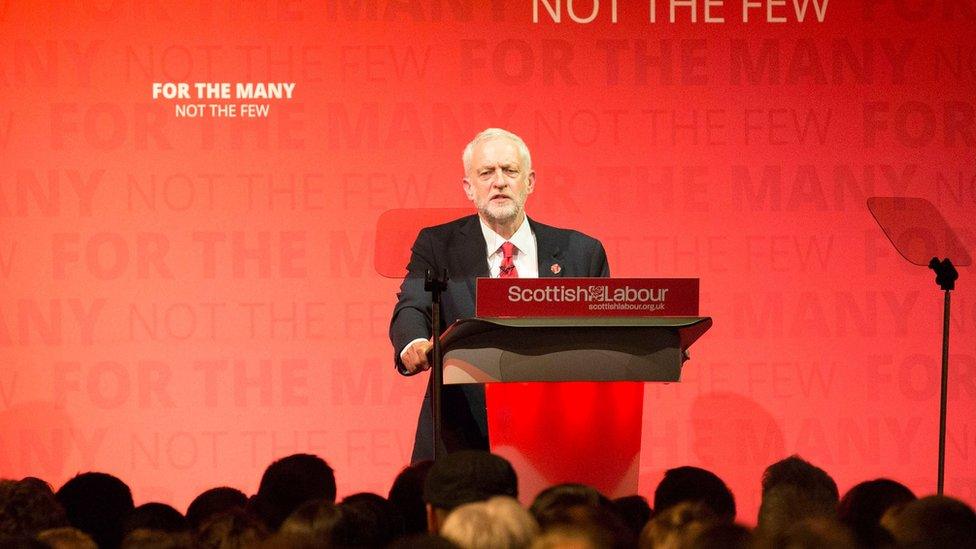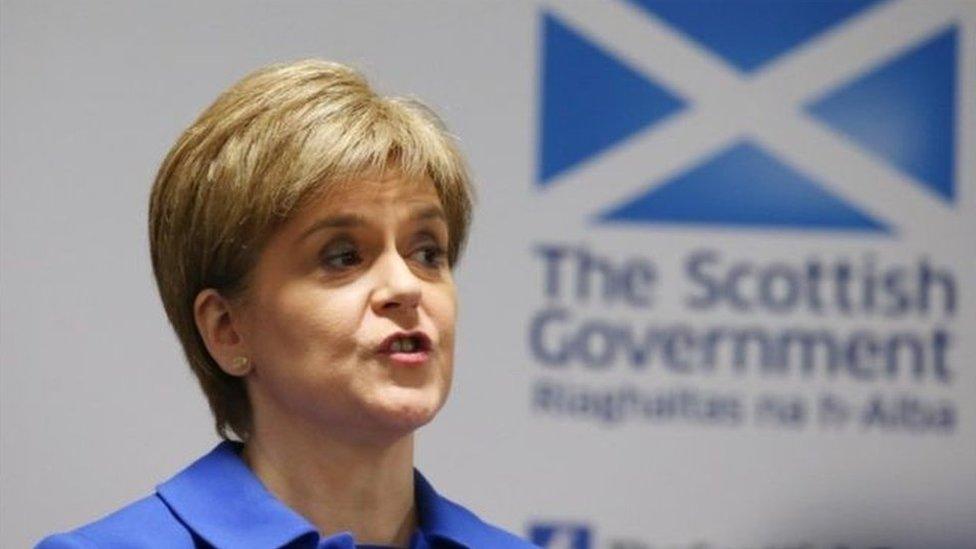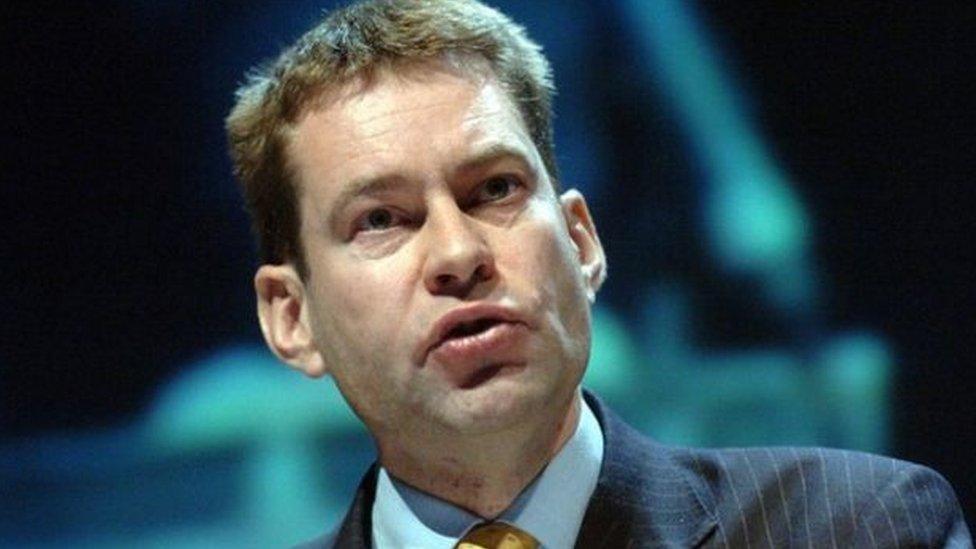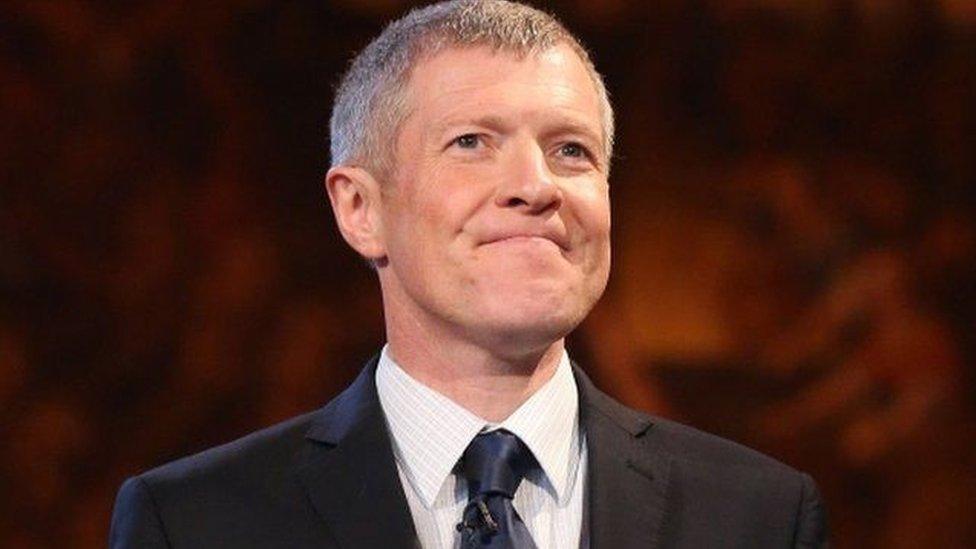General Election 2017: Corbyn joins Scots campaign trail
- Published

Political campaigning has resumed in earnest in Scotland with party leaders all taking to the stump including UK Labour leader Jeremy Corbyn.
Mr Corbyn accused the SNP of accepting "Tory austerity without putting up a fight".
But the SNP said Labour had failed to stand against UK government cuts.
Nicola Sturgeon also outlined a £118bn UK spending boost, but the Scottish Conservatives said the SNP did not know where that money could come from.
Scottish Liberal Democrat leader Willie Rennie said people were "getting fed up" with the SNP and called for voters to "stop yet another divisive independence referendum".
'A tragedy'
With Labour trailing third behind the SNP and Conservatives in Scotland, Mr Corbyn is hoping to boost his party's chances of improving on their solitary Scottish seat at Westminster in the 2015 election wipeout.

Nicola Sturgeon outlined a £118bn spending boost
In a speech in Glasgow, the UK Labour leader sought to frame the election as a choice between Labour and the Conservatives.
He told activists at the city's Old Fruitmarket: "I ask the people of Scotland - who is it to be? A Labour Party for the many not the few, or a Tory party only concerned with protecting its powerful and wealthy friends and donors to the Conservative Party.
"In Scotland I know you have the added dimension in the shape of the SNP, I've made my views absolutely clear over the past few months about their obsession with referenda, unwanted and unnecessary.
"It's a tragedy that Scots have not used the full powers of the (Scottish) Parliament to tackle poverty and inequality."
Public investment
But SNP leader Nicola Sturgeon claimed "both the Conservatives and Labour's economic plans at this election have unravelled".
Ahead of her postponed manifesto launch on Tuesday, she insisted: "The SNP will put forward a responsible and credible fiscal plan that will free up an additional £118 billion of public investment to grow the economy, safeguard our public services, protect household incomes and put the UK's finances back on a stable footing."

Murdo Fraser claimed the SNP did not know how to raise billions
And her deputy party leader Angus Robertson dismissed Labour's electoral chances in Scotland and said: "The only way to protect Scotland from the Tories is with a vote for the SNP. Labour simply cannot win in Scotland."
But Scottish Tory shadow finance secretary Murdo Fraser said: "The Nationalists are trying to dictate to the electorate of the very United Kingdom that they want to break up.
"It's all very well saying they'd raise billions, but they don't seem to know how. The only way would be to massively increase taxes on hardworking people.
"That suggests the SNP is preparing a high-tax allegiance with Labour to make Jeremy Corbyn prime minister."

Willie Rennie said people were "getting fed up" with the SNP
Scottish Liberal Democrat leader Willie Rennie was out campaigning in Milngavie, East Dunbartonshire, aiming to take the seat back from the SNP.
Mr Rennie said: "This election is important to people. We've been really surprised at quite how many people have told us on the doorsteps that they're getting fed up with the SNP.
"Last time the SNP won 56 out of 59 seats in Scotland. People don't want that again. They want to send the SNP a message that they can't have everything their own way.
"Votes for the Liberal Democrats will send a message to stop yet another divisive independence referendum from the Nationalists."
'Voter apathy doubts'
Meanwhile, four out of 10 non-voters think whoever governs the country makes no difference to their lives, according to a new poll.
The poll, carried out on behalf of the Electoral Reform Society, suggests that 42% of those asked believe that election candidates do not understand their life.
But it also suggested that a large number of those not voting on 8 June were not, in fact, apathetic about politics.
Voting reform campaigners insisted claims of non-voters apathy were "simply not true".
In the survey just over a quarter (26%) of non-voters said they regularly talked about how to make their community a better place - with this rising to about a third (32%) when those who probably will not vote were included.
In addition, 27% of those who said they were certain not to cast their ballot in the general election said they regularly discussed politics with friends and family.
A total of 1,035 Scottish residents aged 16 and above were questioned between May 5 and 11.